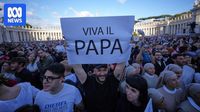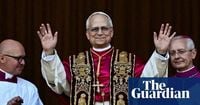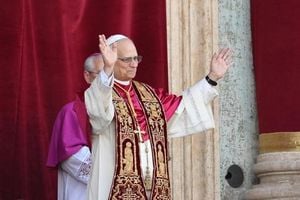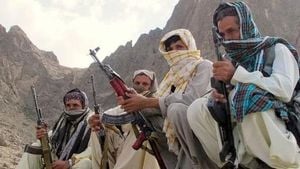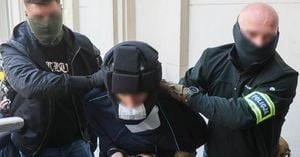Vatican City witnessed a historic moment on Thursday evening, May 8, 2025, as Cardinal Robert Prevost was elected the first American pope in the Catholic Church's 2000-year history. Taking the name Pope Leo XIV, he emerged from the balcony of St. Peter's Basilica to a jubilant crowd, marking a significant departure from the long-held tradition of European popes.
The announcement came shortly after 6:05 PM local time, as white smoke billowed from the chimney atop the Sistine Chapel, a signal that the 133 cardinals had reached a consensus after just four rounds of voting. This conclave was notably swift, surpassing the 2005 election of Pope Benedict XVI, which took nearly 36 hours.
The new pontiff, 69, greeted the throngs of faithful with the words, "Peace be with you," a phrase that resonated deeply amidst the ongoing global challenges. He emphasized the need for unity, stating, "We must be a single people, always in peace," as he paid tribute to his predecessor, Pope Francis, who passed away in April 2025.
Prevost's election is seen as a pivotal moment for the Vatican, particularly given the geopolitical dynamics of the United States and its relationship with the Catholic Church. His background as a missionary and archbishop in Peru has equipped him with a unique perspective, particularly on issues affecting the global south.
In his first address, delivered in Italian and Spanish, Prevost underscored the importance of dialogue and building bridges, stating, "Help us build bridges, with dialogue, to always be at peace." He called for a disarmed and humble peace, invoking the spirit of charity, especially for those suffering.
Amidst the celebrations in St. Peter's Square, US President Donald Trump was among the first to congratulate the new pope, expressing his excitement on social media. "It is such an honor to realize that he is the first American," Trump wrote on Truth Social. His sentiments were echoed by various political leaders and dignitaries, highlighting the significance of having an American pope at this juncture.
Prevost's election was not without its complexities. While he is viewed as a unifying figure, his past comments regarding the US government's treatment of refugees and migrants suggest a potential clash with the current administration. He has previously criticized policies that, in his view, fail to acknowledge the suffering of vulnerable populations.
The election of Pope Leo XIV also sparked reactions from around the globe. Ukrainian President Volodymyr Zelenskyy expressed hope for continued moral and spiritual support from the Vatican, especially given the ongoing conflict in Ukraine. Meanwhile, Chicago's mayor, Brandon Johnson, humorously noted that everything great, including the pope, comes from Chicago.
Prevost's background is noteworthy. Born in Chicago and ordained in 1982, he entered the Order of St. Augustine and earned a doctorate in canon law from the Pontifical University of St. Thomas Aquinas in Rome. His extensive experience in Peru, where he served as bishop and eventually became a citizen, has made him a prominent figure in the Latin American church.
During his tenure as head of the Vatican's Dicastery for Bishops, Prevost oversaw the appointment of bishops worldwide and was instrumental in implementing reforms initiated by Pope Francis, including the inclusion of women in the voting bloc for bishop nominations.
Despite his progressive stance on many issues, some of Prevost's past remarks have raised eyebrows. In 2012, he criticized Western media for promoting what he termed "sympathy for beliefs and practices that are at odds with the Gospel," particularly regarding same-sex families. While he supported Francis's decision to allow Communion for divorced and remarried Catholics, he has shown only reserved support for blessings of same-sex couples.
The conclave process itself was conducted under strict secrecy, with cardinals surrendering their mobile phones and the Vatican jamming signals to prevent external communication during deliberations. Before the conclave, several frontrunners were discussed, but Prevost's deep ties to Latin America and his extensive experience made him a viable candidate.
As the new pope, Leo XIV faces a multitude of challenges. His leadership will be scrutinized, especially concerning the church's response to the legacy of sexual abuse, which has cast a long shadow over Francis's papacy. The new pontiff's approach to these issues, alongside pressing matters such as migration, climate change, and religious freedom, will shape his tenure.
Prevost's election signifies a potential shift in the Vatican's approach, with observers noting that while he may not radically alter Francis's reforms, he could adopt a more diplomatic style of leadership. His commitment to inclusivity and outreach to marginalized communities aligns with the current needs of the global Church.
In summary, the election of Pope Leo XIV marks a significant moment in the history of the Catholic Church, as the first American pontiff brings with him a wealth of experience and a vision for a more united and compassionate Church. As the world watches, the new pope's actions and decisions will undoubtedly influence the future of Catholicism in an increasingly complex global landscape.
